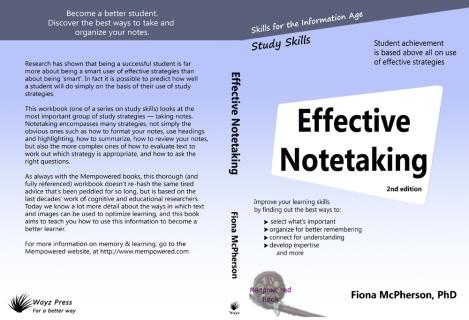You can predict how well a student will do simply on the basis of their use of effective study strategies.
This book is for college students who are serious about being successful in study, and teachers who want to know how best to help their students learn.
Being a successful student is far more about being a smart user of effective strategies than about being 'smart'. Research has shown it is possible to predict how well a student will do simply on the basis of their use of study strategies.
This workbook looks at the most important group of study strategies – how to take notes (with advice on how to read a textbook and how to prepare for a lecture). You’ll be shown how to:
- format your notes
- use headings and highlighting
- how to write different types of text summaries and pictorial ones, including concept maps and mind maps (you'll find out the difference, and the pros and cons of each)
- ask the right questions
- make the right connections
- review your notes
- evaluate text to work out which strategy is appropriate.
There's advice on individual differences and learning styles, and on how to choose the strategies that are right for both you and the situation.
Using effective notetaking strategies will help you remember what you read. It will help you understand more, and set you on the road to becoming an expert (or at least getting good grades!).
Successful studying isn’t about hours put in, it’s about spending your time wisely. You want to study smarter not harder.
As always with the Mempowered books, this thorough (and fully referenced) workbook doesn't re-hash the same tired advice that's been peddled for so long. Rather, Effective Notetaking builds on the latest cognitive and educational research to help you study for success.
Please note that a 3rd edition is now available.
Publication date: July, 2012
Number of pages: 226
ISBN: 9781927166086
1. Introduction
2. Making note-taking an effective strategy
Note-taking is a strategy for making information meaningful
The importance of working memory
PART I: Selection strategies
3. Highlighting important information
An example
What highlighting does
What should be highlighted?
4. Headings highlight structure
Do headings help memory?
How do headings help memory?
Learning to use the topic structure strategy
Do some individuals benefit more from headings than others?
5. Summaries
Topical summaries and overviews
Advance organizers
Creating summaries
6. Graphic summaries
Outlines and Graphic Organizers
Multimedia summaries
Maps
Visual language
PART II: Connection strategies
7. Understanding connection
An example
What this means for note-taking
8. Elaboration strategies
Making comparisons
Asking questions
Mnemonics
9. Concept maps
When concept maps are useful
Mind maps
PART III: Applying your strategies
10. Taking notes in lectures
How taking notes in a lecture is different from taking notes from text
Are there special strategies for taking notes in lectures?
11. Using your notes
Providing a record
Focusing attention
Helping you select what’s important
Organizing information / Helping you make connections
Helping you review
Reducing cognitive load
12. Learning style and individual differences
How individual differences affect your strategy
Cognitive style
Personal preferences and strategy choice
13. Choosing the right strategy
Assessing the text and the task
Choosing the right strategy
Summary of note-taking strategies
Personal profile
Web Resources
Concept & mind maps
Glossary of terms
Answers to exercises
Chapter notes
References

